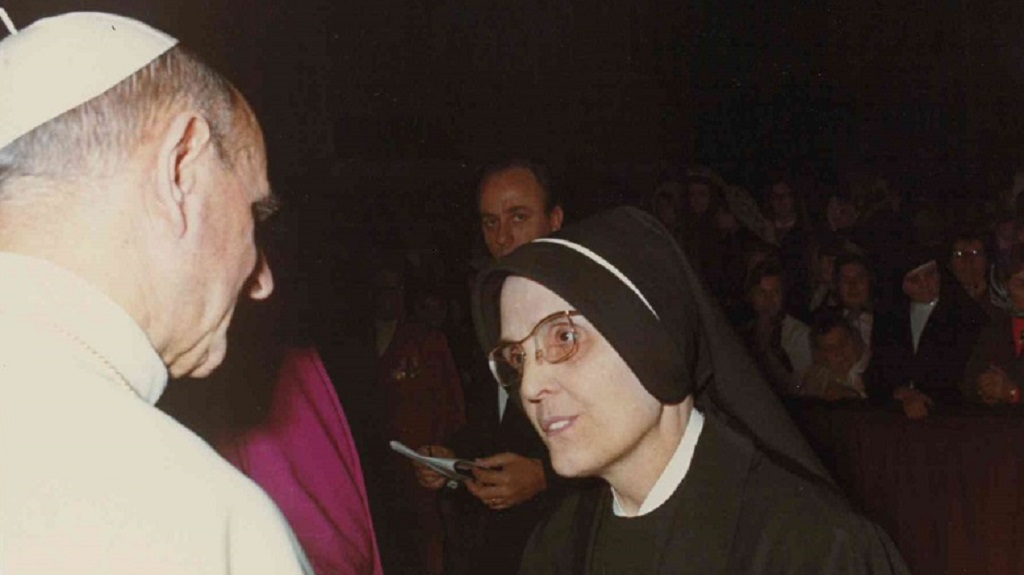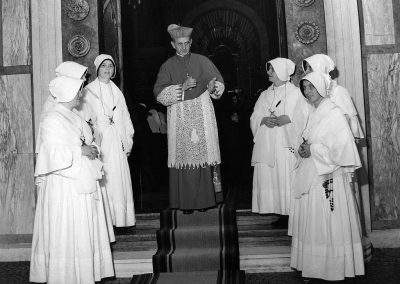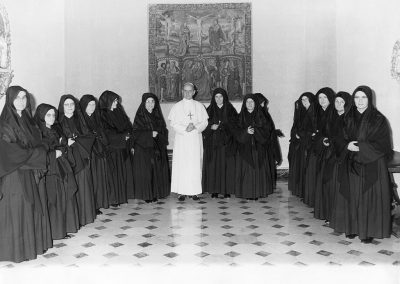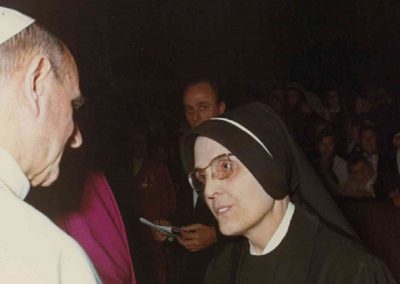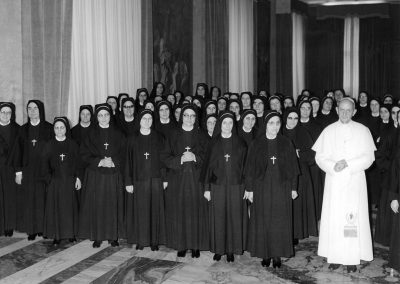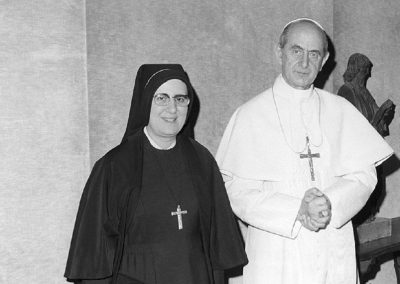With regard to the personal relations of Pope Montini with our religious family, so many times we have heard him bringing them to mind as a father would do with his children, when with fatherly delight he seemed to be saying to us: see how our lives come close together, bring each other to mind … They date back to his infancy, when his mother took him with her on a visit to his grand aunt, Sr. Giuditta Alghisi, who had been admitted into the Institute by Sr. V. Gerosa though she joined it a few months after Gerosa’s death. So too his first Holy Communion in the chapel of “Casa Provvidenza”, Brescia, was described, in the words of Pope Paul himself, as “a very precious moment, engraved in the picture of your religious life” (7 April 1975).
After these precious moments by which his eminent life was integrated into the life of our Institute, before he became Archbishop of Milan, there were the years of World War II, years very intense for Mgr Montini, which brought him into memorably close relations with our religious family. In his capacity as Substitute for the Secretary of State (of the Vatican) he solicited the charity of the Institute, when he sought refuge in Via Sant’Uffizio, Rome, for persecuted Jews and for other persons whose life, in the political situation of the years 1943-1945, was seriously threatened. His quick, discreet messages called for immediate action that could find a solution of even the most desperate cases. That was how the Sisters of Maria Bambina again met the future Pope along the paths of charity.
After that, his years as Archbishop of Milan bound the Institute even more closely to Cardinal Giovanni Battista Montini, more especially when by Decree of Pope John XXIII he became its Cardinal Protector. “If it gives you pleasure to know that there is someone who cares for you, who looks upon your religious family with deep esteem and regard, who when an opportunity offers itself will do his best to smoothen your way and defend you, and assure you that even civil authorities owe you respect and collaboration, I will, by God’s grace, do so”. These were words he said to the sisters of the Generalate on 18 May 1960, in occasion of his installation as Protector of our Congregation whose “spirit and programme”, he affirmed, had his “devoted support” (14 March 1960).
In the course of the fifteen years of his pontificate the Institute, he was once more pleased to remain its Protector: “Raised to the throne of Peter I wish to keep my office as Protector of the Institute as a proof of fatherly affection towards it and as a glad encouragement of the generous commitment, so well known to us, of all its religious”: so ran his telegraph message, signed by Pope Paul VI himself, on 11 July 1963, and sent to Mother Costantina.
Of that “protection” we have had, on unforgettable occasions, the most tender, cherished proof. He granted first to Mother Costantina and then to me private audiences which have imprinted on my soul words of gentleness and vigour. He gave important audiences to the Chapter members on 3 March 1969 and on 7 April 1975; there was a very familiar though shorter one given to the general council and the provincial superiors of Italy on 5 May 1973. Besides, there were his greetings, gestures of fatherly pleasure every time groups of sisters of Maria Bambina were present at his Wednesday audience. And I love to call to mind the friendly, warm manner in which he waved his hand to the sisters who never failed to attend the Sunday Angelus from the terrace of our House in Via Sant’Uffizio, facing the Pope’s windows.
Pope Paul has left to our Institute clear directives and programmatic guidelines for an itinerary of renewal and of missionary zeal. “If I may express a wish I have”, he said to the Chapter members on 3rd March 1969, after noticing an unequal distribution of sisters over the various Continents, ”it is this: that instruments ever more fit, even in the number of persons available be provided for the needs of today’s apostolic action, in areas which unfortunately are more poorly furnished with works and active sisters. It seems to me that the ardent spirit of your holy foundresses, so open to the spiritual distress of men, is today more insistently asking this of you as well; and I am sure that you will respond favourably to their desire, as you have always done, and will more than ever do”. His wish has certainly added vigour to the urging of the Holy Spirit, resulting in the Special Chapter’s directives to re-distribute the apostolic strengths of the Institute, taking into account the most urgent needs of the Church. The way forward is hard and demands a spirit of poverty and courage, yet the Institute is today gradually building on this new ground of its mission.
Speaking of the essential link between consecration and mission and of the apostolic dimension of prayer the Pope said: The Charity “is your charism: you must learn how to draw it from the ever-living source of the Life of the Blessed Trinity, so as to live it within you in the intimacy of grace and communion with God through the Church, and spread it outwards as in thousands streamlets towards the brethren” (7 April 1975). Pope Paul has proclaimed by his life as well as by word that a humble, profound intimacy with the Father is the one-and-only source of communion and missionary drive. All through his life his mind sought Christ the Lord, he loved Christ in the way eminent saints have loved him, and from that love he drew an inner vitality that heightened his human energy. I suppose all of us have noted this aspect of his message; for the Institute it speaks of hope: if our religious family, which is sadly diminishing in number, regains gospel quality, it will flourish again and vocations will surely spring and grow.
“Today more than ever the religious life must be lived in its fullness and in its high, severe demands of prayer, humility, poverty, spirit of self-sacrifice and austere observance of the vows. In a word, it must be holy, because no effort, no other method however generous it may be, can ever take the place of holiness” (Letter-message of 16 February 1975). That has always been the Pope’s standpoint.
Pope Paul who by temperament was a man who suffered deeply, has written “Gaudete in Domino”, an Apostolic Exhortation on Joy, and on the theme of joy he dwelt with us as well in his familiar talks. On 7 October 1973, at a moment in a lively conversation, he said to me, “Go ahead with trust!” ... “and with the joy of belonging to the Lord” I added. He eagerly joined in again: “Yes, yes, Exactly! Please teach the other Sisters too that their life should bear the mark of self-sacrifice, of the Crucified Lord, but in joy”.
– taken from the letters of Mother Angelamaria Campanile, 1978

